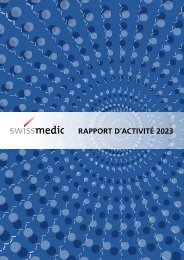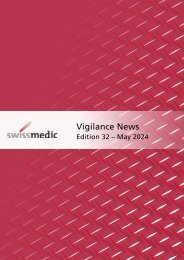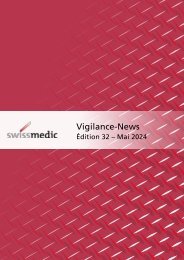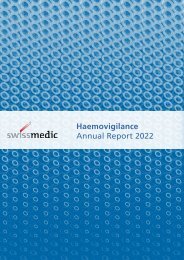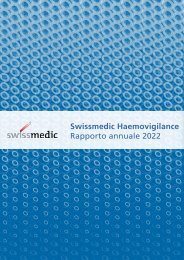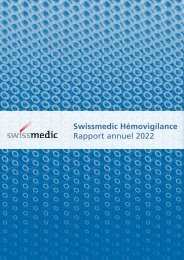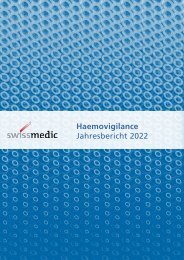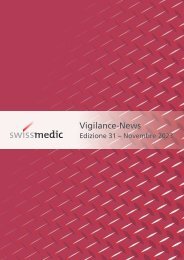Swissmedic Vigilance News Edition 21 – November 2018
In this edition: Isotretinoin and DOAC – Updates Confusion between amphotericin B formulations Guest articles: RPVC Zurich and RPVC Ticino Quality Assurance in Transfusion Practice Statistical Review 2017
In this edition:
Isotretinoin and DOAC – Updates
Confusion between amphotericin B formulations
Guest articles: RPVC Zurich and RPVC Ticino
Quality Assurance in Transfusion Practice
Statistical Review 2017
Create successful ePaper yourself
Turn your PDF publications into a flip-book with our unique Google optimized e-Paper software.
Guest article<br />
Pharmacovigilance, drug safety and<br />
knowledge transfer:<br />
The Swiss RPVC Approach<br />
Stefan Weiler (1), (2)<br />
as part of the Swiss RPVC collaboration, consisting of<br />
the Regional Pharmacovigilance Centres in Geneva,<br />
Lausanne, Bern, Basel, Ticino, Zurich<br />
(1) Regional Pharmacovigilance Centre Zurich, Department<br />
of Clinical Pharmacology & Toxicology, University<br />
Hospital Zurich and University of Zurich<br />
(2) Tox Info Suisse, Associate Institute of the University<br />
of Zurich<br />
“The doctor prescribes medicines about<br />
which he knows little to patients about<br />
whom he knows even less.”<br />
Diagnosis:<br />
"Adverse Drug Reaction"<br />
Ahmed Wilfried Waba, WHO, 1984<br />
Adverse drug reactions (ADR) are medication-induced<br />
conditions whose symptoms<br />
mimic those that can themselves be caused<br />
by illnesses. Headache, dizziness, diarrhoea<br />
or vomiting are temporary and reversible<br />
symptoms that can occur as part of a viral infection<br />
for example. By contrast, other conditions<br />
such as carcinogenesis are protracted<br />
processes that can be promoted by various<br />
factors. It is often difficult to separate out<br />
the various aetiologies and weigh up the<br />
risks factors on both sides. Physicians are<br />
trained to diagnose, define and “successfully”<br />
treat diseases. Medicines are developed<br />
and manufactured to cure patients, or<br />
at least improve their condition. But the<br />
other side of the pharmacological coin can<br />
soon be forgotten.<br />
”If it is claimed that a substance has no side<br />
effects, then there is a strong suspicion that<br />
it does not have any principal effect.”<br />
Gustav Kuschinsky, 1904-1992<br />
Diagnostic investigations of adverse reactions<br />
are usually based on the exclusion of<br />
other causes. Laboratory markers that clearly<br />
diagnose an adverse reaction are not present<br />
in many cases. Like other tests, such diagnostic<br />
methods <strong>–</strong> e.g. HIT antibody assay <strong>–</strong><br />
possess a sensitivity and specificity that allows<br />
for the possibility of false-positive and<br />
false-negative results. So it’s not so easy to<br />
pinpoint the culprit (the suspected drug)!<br />
And this is what pharmacovigilance is all<br />
about: Criteria such as latency period, course<br />
of the reaction, frequency, severity, reproducibility,<br />
mechanism or nature of the adverse<br />
reaction strengthen the diagnosis of a<br />
drug-induced illness.<br />
Descending from the ivory tower:<br />
Knowledge transfer in pharmacovigilance<br />
Acting on behalf of <strong>Swissmedic</strong>, the Regional<br />
Pharmacovigilance Centres (RPVC)<br />
are responsible in Switzerland for receiving<br />
and processing ADR reports from healthcare<br />
professionals, patients and consumers. The<br />
RPVC are usually linked with the Clinical<br />
Pharmacology and Toxicology departments<br />
of the university hospitals. Clinical pharmacology<br />
is a medically and scientifically established<br />
discipline in Switzerland that addresses<br />
the rational and safe use of pharmaceutical<br />
products in humans. Drug safety and<br />
pharmacovigilance are core areas of clinical<br />
pharmacology and toxicology, where you<br />
will find experts who help record, prioritise<br />
and process ADR. They support the detection<br />
of potential signals and the flow of information<br />
to the primary reporter, the authorities<br />
and, under certain circumstances, to the<br />
public as well. On the other hand, those who<br />
<strong>Swissmedic</strong> <strong>Vigilance</strong> <strong>News</strong> | <strong>Edition</strong> <strong>21</strong> <strong>–</strong> <strong>November</strong> <strong>2018</strong> 15 | 39




